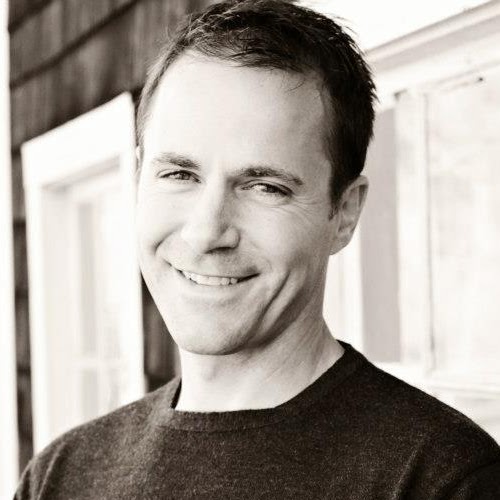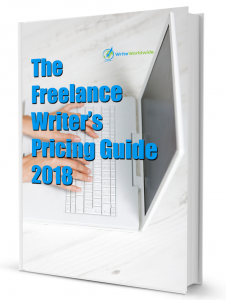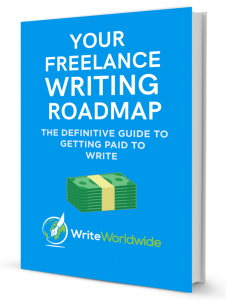Hi WriteWorldwide readers, and thanks for your continued support of the blog! This week we’re bringing you an exclusive interview with Steve Roller, founder of the popular Copywriter Café Facebook group and Café Writer membership site.
Read on for some great tips from Steve – no matter where you are in your writing career …
1) Hi Steve, please tell us a little about yourself and your career as a writer.
I’ve been a copywriter since March of 2009. My background is in direct sales, and I did quite well, but it wasn’t really getting me anywhere.
So I had aspirations to build my own business, but I didn’t know what that would look like. When I discovered copywriting it was the perfect match. I was able to combine my sales skills and the ability to read people. I didn’t really have any writing experience, but that can be learned. Understanding people and the psychology of selling is more important.
2) Did you grow up wanting to be a writer? And how did you break into the industry?
No, writing was the furthest thing from my mind. I only wrote two papers at university, and neither one was very good.
I took a course on copywriting, and it immediately resonated with me. I remember thinking, “This is brilliant! You can write words in the right way and the proper order, and get people to buy things!” For some reason, even though I had spent 17 years selling, I had never heard of copywriting. I was smitten, and the romance hasn’t worn off.
3) What advice do you have for beginner freelance writers?
Start with who you know. My first year as a full-time copywriter, I mostly worked with people I knew. Friends of mine who had businesses, local business owners I was acquainted with, and friends of friends.
Focus on helping people get more customers and increase sales. Most small businesses aren’t thinking in terms of better copy and good writing. They just want to stay ahead of the competition, keep customers coming in the door, and keep them coming back. We can help them do that.
Become known as an Idea Generator. Give away good ideas for businesses, even if they don’t work with you. Focus on serving people and helping them solve problems. Get away from talking about copywriting per se.
4) Do you have any advice for writers juggling freelance writing with a full-time job?
Don’t do it! Ha. Seriously, it’s not easy. For me, it wasn’t a time factor. I simply couldn’t figure out how to switch my brain off and on. When you’re working for an employer, you owe them your time and mental energy. It’s hard to see yourself as a real writer when it’s not your full-time gig.
If you’re a writer, in my mind, why not be a full-time writer?
Make it your main deal. Get a few steady, ongoing clients, even if they’re small. Then give yourself a deadline, 6-18 months out, when you’re going to leave your job. Try to get a few more clients before you quit.
5) What’s your opinion on the subject of choosing a writing niche?
I don’t believe you need to pick a niche. It’s overrated. I never did, and I did just fine. If you have a particular subject area you’re interested in, go for it. But otherwise, I think you’re better off focusing on a particular type of service, and offer that to clients in any area.
6) Winning new clients is always a hot topic on the WriteWorldwide blog. What’s the most effective prospecting method you’ve used to find new work?
Like I said earlier, start with who you know. Let people know what you’re doing. Don’t make it seem like it’s a little writing hobby. No! You’re a writer, this is what you do, and people pay good money to have you help them. Network naturally with people who know you.
Two, make a big list of people and businesses you’d like to work with. Connect with them directly by email or mail. Give them ideas instead of just pitching them on hiring you.
7) What do you wish you’d known at the start of your freelance writing career?
That it takes a lot more activity to make really good money than I thought it would. New writers don’t often break it down and calculate how many projects they’ll need to do, at what price, to hit their income goal. It’s a lot. You have to hustle, and you need consistent marketing systems to keep your pipeline full.
8) Name one book, one tool, and one article that have helped you in your writing career.
“Choose Yourself” by James Altucher turned me on to the concept of giving away ideas. It’s been a huge key to my success.
I’m not much of a tool or tech guy. I’m old school on so many things.
One article that’s had a big impact on me: “The Writer Runs This Show” by Brian Clark of Copyblogger. It shows us how important we writers are.
9) Who are your biggest influences and people you admire in the freelance writing industry?
I love the way James Altucher writes and the fact that he’s kind of quirky but doesn’t care what anyone thinks about him. Extremely sharp, well read, and a savvy business guy.
Ed Gandia is someone I have huge respect for as a writer and as a fellow coach. He’s had a successful career and has helped a lot of freelancers launch their businesses.
10) What does the future hold for you – are you involved in any new projects related to writing?
I run the Copywriter Café, a Facebook group of over 6,000 copywriters, and my Café Writer membership site is growing fast. That’s going to be my main focus the next five years.
My first print book is coming out next month, The Freelancer Manifesto: 11 Big Ideas to Stand Out and Thrive in the New Economy. Going forward, I’m planning to write a book every year. I have eight more titles already set.
And I have a new report for writers called “The Last Pricing Guide You’ll Ever Need.” It eliminates the guess work on pricing, and makes sure you don’t leave money on the table.




Thank you WriteWorldWide and Steve for this piece.
It’s been a great read and I’ll save this link…filled with great tips.
Thanks, Christa. Glad it helped.
As always, Steve, great ideas that help today! I feel fortunate to have found Copywriter Cafe. A tremendous source of both wisdom and encouragement! Thank you!
You’re welcome, Kelly. Glad you found us.
Great interview, thanks, Richard! I’ve been a member of the Copywriters Cafe FB group for a while now and only last week joined the membership site. I don’t know why it took me so long to join, but I’m glad I did. There is SO much great information and interaction there. I feel I’m in the presence of giants, but I’m at their feet, learning.
I encourage every writer, copy or content, to join as well. You get so much value for less than a dollar a day. Steve is not only an outstanding and successful copywriter, he is an encourager as well. He gets as much satisfaction at others’ success as he does his own. He’s the real deal.
Thanks for your comment Sandra! I’m a member, and I definitely agree that Cafe Writer is great value and a fantastic learning experience.
And yep, Steve is the real deal – I’ve got a lot of out his one-to-one coaching in particular.
Thanks, Sandra. Glad to have you! Let’s connect sometime.
Thanks, WriteWorldWide for posting such a great interaction with Steve. The interview is a wonderful encouragement to those aspiring to be great writers.
Thanks Doreen! Glad you enjoyed the interview. Check out Steve’s Cafe Writer site if you haven’t already. It’s full of great resources for freelance writers – The 70 Day Sprint is a personal favorite.